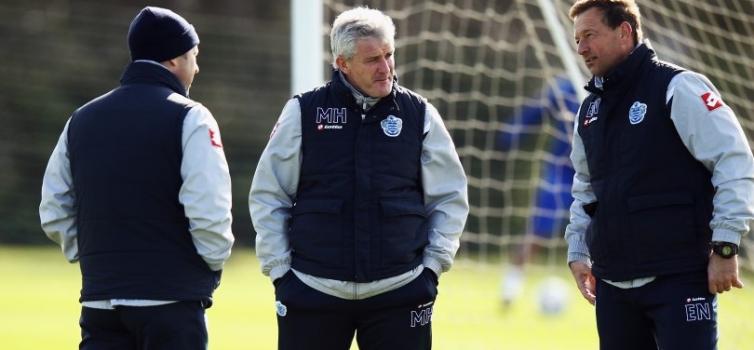Mark Hughes: Same assistants, same results?

Welsh trio Mark Hughes, Mark Bowen and Eddie Niedzwiecki have been friends for decades
Written by Simon Austin — March 16, 2018
PERHAPS the least surprising thing about Mark Hughes’ appointment at Southampton this week was that he brought assistants Mark Bowen and Eddie Niedzwiecki with him to St Mary's.
This is the seventh club Hughes has worked at during a 19-year managerial career - and the duo have been alongside him at every juncture. Hughes and Bowen were team-mates for Wales Under-15s in the 1970s and, along with keeper Niedzwiecki, played together for the senior side a decade later.
When Hughes, a legendary player for club and country, was appointed Wales manager in 1999, he brought his friends onto the coaching staff as well. Since then, they've been with him every step of the way - at Blackburn, Manchester City, Fulham, QPR, Stoke and now Southampton.
There have been little spells elsewhere, for Bowen in particular, who worked alongside Steve Bruce at Crystal Palace and Birmingham, but the fact remains - everywhere that Hughes has been, his two sidekicks have been there too.
And it begs the question: What is the evolution of Mark Hughes as a manager? Will Southampton basically be getting the same boss who was sacked two months ago by Stoke?
Dr Dan Parnell and Dr Paul Widdop have done extensive research on networks in football and have found that relationships - friends, family, past colleagues and historical trusted connections - tend to trump rational decisions.
“The network can become one of people who see the same things, think the same way and share the same information," they wrote in a piece for TGG last year.
“If a group shares strong relationships and all the individuals are relatively similar, there will be many redundant connections regurgitating the same information, which stifles creativity and innovation.”
This is not to decry Hughes' managerial record, because he has had highs as well as lows during his career. But has he really evolved? Does he have assistants who will challenge him or make him think in different ways?
Contrast his approach with that of his old mentor at Manchester United, Sir Alex Ferguson. The Scot had seven different assistants - Archie Knox, Brian Kidd, Steve McClaren, Jimmy Ryan, Carlos Queiroz, Walter Smith and Mike Phelan - during his 27-year tenure at Old Trafford.
Nearly all of them went on to become managers in their own right, which was a mark both of the calibre of the individuals and also the fact that Ferguson was not afraid to have strong-minded and ambitious men alongside him.
In the case of Queiroz, the appointment was made following a formal recruitment process - something which is still very rare in football.
“When Carlos came in for his interview, he was absolutely immaculate,” Ferguson remembered. “What you are looking for in an assistant is someone you can trust, who is hard working; someone with imagination who has intensity and concentration.”
Similarly, Rene Meulensteen had never met the Scot before he arrived for interview about a job at the club’s Academy. The Dutchman rose through the ranks to become first-team coach for six years, before going on to a Premier League manager’s job of his own.
Now, you might say it’s unfair to compare Hughes with Ferguson. After all, one is a managerial great who was at the same club for 27 years. The other isn’t.
But the principles remain. Ferguson wasn't afraid to make changes to stay ahead of the game. He realised football was constantly changing, that he had to as well, and that evolving his staff was a key part of the process.
The final word here goes to Tony Strudwick, Wales’ new Head of Performance, who was part of Ferguson’s inner circle for six years.
“During his tenure at Man United, Sir Alex was continually updating and trying to be innovative,” Strudwick told TGG.
“When he first came down from Aberdeen [in 1986] he was initiating things like pre-match meals. He was always looking around to see where the next innovations could come from.
“He brought foreign coaches, Rene Meulensteen and Carlos Queiroz, into his team, so he was always looking to get the edge there. And towards the end he brought in someone to look at visual cognitive coaching, which was well before anyone else. He was constantly evolving."
Update (17.03.18): Spencer Prior, the former Leicester City and Manchester City defender who managed the Thailand women's team until last year, made a good point about this piece on LinkedIn. There is a difference between a manager who has been in place for a long time, and who feels secure in his position, like Ferguson; and someone coming into a new job, like Hughes.
He wrote: "Disagree 100%.
When you take a job you MUST have your own staff around you. It’s a lesson I’ve learned from working in Thailand, and not taking my own staff.
Archie Knox went with Sir Alex to Man Utd, and it was after that he went out on his own. As did those that followed at Utd.
This says more about the ambitions of the assistant than the manager. Of course the manager is going to surround himself with staff he trusts....especially here in Australia where there are so few jobs."




-1.png)





